Justin Kaufman's Definitive Statement on the James Frey Controversy
Separated at birth?
Tuesday, January 31, 2006
Monday, January 30, 2006
What Are You So Grumpy About?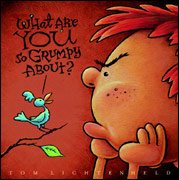 When bathtime is over, and the stopper has just been pulled from the drain, my three-year-old has to get his tub-time yahoos out one more time. He gets out of the still-water-filled tub and turns to face it, his tush and legs bright pink from the warm water.
When bathtime is over, and the stopper has just been pulled from the drain, my three-year-old has to get his tub-time yahoos out one more time. He gets out of the still-water-filled tub and turns to face it, his tush and legs bright pink from the warm water.
"Did someone leave the toilet seat up and you didn't notice? HEY!!!" and then he splashes headfirst back into the tub, reemerging with his hair slicked down flat on his head and rivulets of water streaming down his face as he looks up at me to see if I've noticed his performance.
I've noticed, but in addition to thinking that yes, indeed, he is cute, I'm also wondering where he picked up that little routine.
A re-reading of Tom Lichtenheld's What Are You So Grumpy About? last week finally clued me in. We'd gone through a period of reading it last year, but I'd had no idea it was that memorably hilarious that he'd be staging scenes from the book a year later.
I know better now. What Are You So Grumpy About? runs down the list of all the things that could make a kid grumpy: Did you stub your toe? Were all your favorite clothes in the wash? Did your brother/sister touch you? Did your gravy touch your peas? Or, worst of the worst: Did somebody make you laugh and you forgot what you were so grumpy about?
Lichtenheld, a free-lance advertising art director, accompanies the text with mixed-media illustrations, bold colors, and a lot of visual humor that children really enjoy. Such as the infamous picture of a toilet bowl with two feet sticking out and a cartoon bubble emanating from the bowl that reads, "HEY!" Comedy gold, I tell you, pure comedy gold that never grows stale no matter how many times it's retold.
Lichtenheld lives in Geneva, Illinois, about 25 minutes from my house. I'm going to make him come over every night from now on and mop up the water from my bathroom floor.
_________________________
What Are You So Grumpy About?
by Tom Lichtenheld
Little, Brown
Ages 3-6
Kirkus Starred Review
Sunday, January 29, 2006
Junie B. Jones.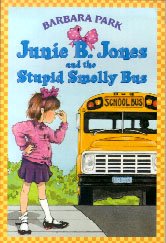
My oldest son has reached that awkward age where he's too old for board books, but not a skilled enough reader to read chapter books on his own. We wandered around in a literary desert for a bit, until my friend Portia recommended we start up with Barbara Park's Junie B. Jones series. I'd been avoiding serial books because it seemed like so many of them were insufferable Nickelodeon or Disney tie-ins. I'm the first to admit, we're big fans of Spongebob Squarepants and Bear in the Big Blue House, but the revelry we enjoy onscreen falls crashingly flat when translated to the page. Because both my children beg for multiple readings of books they love at one sitting, I have to opt for books I can tolerate reading several times without losing my patience with the stilted, ham-handed, often cloying prose that often accompanies books written to cash in on the popularity of another medium rather than being written with the purpose of simply telling a good story.
Portia was dead right - the Junie B. Jones are great fun. The Junie B. Jones series, 22 books so far, chronicle the beginning school years of an impetuous, bull-headed little girl. Told from Junie B.'s point of view, Park tackles the school life of a Kindergarten/first grader, with attention to detail that I am very happy to see. On Junie B.'s first day of Kindergarten, related in Junie B. and the Stupid, Smelly Bus, Park writes:
...Mrs. took our class on a walk around the school. Everyone had to find a buddy to walk with.
My buddy was Lucille. We held hands.
The boy I can beat up was right in front of us. His buddy was that Jim.
That Jim I hate.
The first place we walked to is called the Media Center. My mother calls it a library.
My son's mother calls it a library, too. With this one small paragraph, Junie B. gains the trust of her young readers. Not only does Park normalize new places like media centers to help young schoolchildren adjust to their new lives, but the placement of such a perfect little detail, "My mother calls it a library," enables the child to identify with Junie B. - if she's going to be okay, then the young reader will probably be okay, too.
As far as readability goes, Park throws in enough winks toward the adult reader, in the way that was mastered by the late Louise Fitzhugh (author of the beyond brilliant Harriet the Spy books), which makes curling up with your six-year-old an especially good treat.
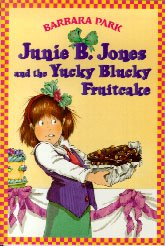 In Junie B. Jones and the Yucky Blucky Fruitcake, Junie B.'s parents get lost in their own hilarity, much to the annoyance of Junie B.
In Junie B. Jones and the Yucky Blucky Fruitcake, Junie B.'s parents get lost in their own hilarity, much to the annoyance of Junie B."See it, Daddy? See the cake I won!"
Daddy looked at my cake in shiny aluminum.
Then he looked at Mother.
He shook his head very slow. "No," he said. "Don't tell me."
Mother rocked back and forth on her feet.
"Yupper," she said.
Daddy closed his eyes. "You mean she picked..."
"A fruitcake," said Mother.
I jumped way high in the air again. "Yea! Yea! A fruitcake! I picked a fruitcake! I picked a fruitcake! And now I would like to see what it looks like. Only I can't even lift this big guy off the ground."
Daddy picked it up and set it on the table.
I pulled off the aluminum foil.
Then I just stared and stared at that thing.
It was brownish and slickish. And there was slippery shine on the top.
"It got rotted," I said very quiet.
Mother smiled a little bit. "It's not rotten, Junie B.," she said. "That's just the way fruitcakes look."
I looked even closer at it. "Yeah, only I don't even see any fruits on this gunky thing."
Daddy pinched off a little piece for me to look at. He showed me some hard green things. And some hard yellow things. And some hard red things. he said those were the fruits.
I put my tongue on a green one.
"Yuck!" I said. "Bluck!"
..."I never even want to taste this yucky blucky thing again," I told him.
Mother smiled. "But that's the great thing about fruitcake, Junie B.," she said. "You never actually have to eat it. Because it never goes bad."
"Fruitcake has been known to last for years," said Daddy. "And if you ever get tired of it, you just put a bow on it. And you give it to someone you hate for Christmas."
Then him and Mother laughed and laughed. Only I didn't even get that joke.
In the series, Junie B. covers all the ground one expects a Kindergartener/First Grader to cover, from the first day of school to calling Emergency 911 to new baby brothers to the heartbreak of being excluded from a classmate's birthday party. Because Junie B. never reacts in an overly precocious way - making the same bull-headed mistakes that a typical 5 or 6-year-old would make, children get totally sucked in.
When Junie B. gets locked out of the girls' bathroom at school, she calls 911 to help her. (Using the logic of a 5-year-old, calling 911 was the reasonable thing to do, because 911 is an emergency service, and she was having a potty emergency.) My son, who had already gone through the experience of making an unwarranted phone call to 911, became very agitated over her Very Serious Crime, and actually lost sleep over it. For the next few weeks, we read our new Junie B. Jones books in the afternoon, rather than as bedtime stories.
_________________________
Junie B. Jones series
written by Barbara Park
Random House
Junie B.'s web page
Sunday, January 22, 2006
Bob Tarte v. Lisa Crystal Carver: Ducks Punked.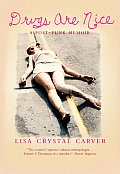

I wanted so badly to write a review contrasting two memoirs without dragging James Frey into it. Instead, I've been sitting here trying so hard to come up with something else to begin with that I'm working my way right around to a strong case of writer's block. So: Frey.
I was watching The Viewlast week, ensnared by the spooky horror that Star Jones has become. (Remember how pretty she was when she was fat? She looked like a self-satisfied Persian cat, all softness and velvet and large, intense almond eyes. Now, Skeletor.) The ladies were discussing the Frey debacle and Oprah's odd, impassioned defense of him. Joy Behar, who is your go-to person for common sense on that show, rebutted Oprah by pointing out that if we agree that it is acceptable for memoirs to be made up out of whole cloth and presented as truth, then it calls into question the truthfulness of such memoirists as
Elie Wiesel, who documented his experiences in Auschwitz and Buchenwald in his international 1958 classic Night. If you click on the link, you'll see it leads to Oprah's book club, who has selected Night as their next book. Behar made two points, the first being that now Oprah has to decide what is truth and what isn't, and which memoir she will take as fact and which she won't, and why. If she fails to do this, she opens the door to Behar's second point, which is that Holocaust-deniers are now free to use Frey's book and Oprah's admission that adherence to the truth in one's life story is irrelevant to dismiss the bleakest years of Wiesel's life as fictitious.
I would also add that the power of the memoir is its truth. Any good book pulls you into its life, allowing you to examine it from the inside out, seeing and hearing and feeling what the author wants you to. A good book releases you with an added dimension to your own character, a new perspective. Additionally, a good memoir adds the extra impact that the events are true, that this actually happened, that you, the reader, walked in the shoes of actual human beings. When Wiesel is forced into a cattle car with hundreds of suffering Jews, the reader feels his claustrophobic despair, and closes the book with the resolution that history must never be allowed to repeat this lesson in human sorrow. The power of the memoir is that it does not let you off the hook. You should not be able to shrug off a memoir with an "It's only fiction." It is for that reason that Frey's fabricated life story is a betrayal, not only to himself and his readers, but to all writers who tell their truths as closely as they can.
The two memoirs that I've recently finished, Bob Tarte's Enslaved By Ducks, and Lisa Crystal Carver's Drugs Are Nice, are memoirs that seem to be as close to the truth as one can hope for, Carver's because one can read the back issues of her classic personal 'zine Rollerderby as prep notes for the novel, and Bob Tarte because while one can imagine making up a life spent spraying scratch feed around the backyard in between reading Reader's Digest and watching Wheel of Fortune, one can not imagine the purpose in doing so.
Reading the books side by side was an interesting contrast. Both Carver and Tarte are skilled at drawing the reader into their lives and living beside them as they do whatever it is they do. Tarte's life was similar to sitting inside an idling wood-panelled station wagon with a Jesus fish stuck to the back bumper, while Carver's was like riding shotgun on the vomit-smeared passenger seat of a shockless, brakeless Gremlin, screaming down a back road filled with pot holes at seventy miles an hour, blowing past all the "Bridge Out Ahead" warning signs as she asks you if you want her to turn out the headlights.
Back at the duck farm, Tarte sits at the kitchen table with a parrot on his head and a duck by his feet, while his wife looks for her Bible before she heads out to church. "More tea?" he offers. "It's decaf peppermint. I used to drink Earl Grey, but that was just too racy for me."
These distinct characteristics each irritated me at times, Tarte because his life was too slow, and Carver because hers was too fast. (And their porrige was too hot and then too cold! And their beds were too hard and too soft!)
Enslaved By Ducks is a compilation of essays, detailing how Tarte and his wife, Linda, slowly acquired a large menagarie of birds, cats, and rabbits. Each of the 15 chapters in the book tells the story of each of their pets and their personalities, their various illnesses, what they ate, and their relationship to their owners. Beyond that, nothing much happens. Tarte's book is what James Herriot's classic All Creatures Great and Small would be if you took away all the drunken binges and rude customers.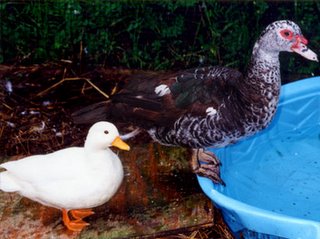 This isn't precisely a terrible condemnation, because Tarte has the same gentle wit and self-deprecating charm as Herriot, making him very readable. And although I am not by any means a bird-lover, I have to admit he is the owner of what is hands-down the world's cutest duck. Ultimately, however, the duck and its cute orange feet were not enough to keep me there on the farm, and I was eager to hop into Carver's Gremlin and go along for the ride.
This isn't precisely a terrible condemnation, because Tarte has the same gentle wit and self-deprecating charm as Herriot, making him very readable. And although I am not by any means a bird-lover, I have to admit he is the owner of what is hands-down the world's cutest duck. Ultimately, however, the duck and its cute orange feet were not enough to keep me there on the farm, and I was eager to hop into Carver's Gremlin and go along for the ride.
Drugs Are Nice is being hailed as the definitive document of the post-punk era, written by one of the leaders of the anarchic movement, Lisa Crystal Carver. Creator of Suckdog, a band created by Carver and her high school BFF Rachel to impress the notorious GG Allin. In fact, it would be easy to say the entire memoir chronicles Carver's daddy issues, as she leaves her sociopathic drug-dealer father and careens from GG Allin to her husband, French performance artist Jean-Louis Costes, to her personal Mount Everest, Satanic priest and alleged Nazi Boyd Rice, ramping up her crazed, self-destructive antics accordingly. But Drugs Are Nice tells much more than that. Amidst Carver's relentless quest to cause herself enough pain to dull the numbness inside her, she manages to consistently create highly-praised works of art along the way, from the famous Suckdog circus to her combative, loopy performance art she staged with Costes, to being credited with creating the genre of the personal 'zine (in Drugs Are Nice, she disavows her hand in creating the popular artform, attributing its creation instead to Pagan Kennedy.)
In fact, it would be easy to say the entire memoir chronicles Carver's daddy issues, as she leaves her sociopathic drug-dealer father and careens from GG Allin to her husband, French performance artist Jean-Louis Costes, to her personal Mount Everest, Satanic priest and alleged Nazi Boyd Rice, ramping up her crazed, self-destructive antics accordingly. But Drugs Are Nice tells much more than that. Amidst Carver's relentless quest to cause herself enough pain to dull the numbness inside her, she manages to consistently create highly-praised works of art along the way, from the famous Suckdog circus to her combative, loopy performance art she staged with Costes, to being credited with creating the genre of the personal 'zine (in Drugs Are Nice, she disavows her hand in creating the popular artform, attributing its creation instead to Pagan Kennedy.)
Her relationships with the destructive, often-abusive men in her life are described in a bemused, detached manner, like Jane Goodall taking notes on nearby warmongering chimpanzees who might rip her arm off if the mood strikes them. While she clearly loves her odd French husband Costes, she also clearly fears Boyd Rice. In an issue of Rollerderby, she includes a letter from Costes, written while he was in Guyana, that seems to sum him up perfectly.
Dear Lisa,
Late again. Why? Three days before to leave the forest by plane, I was working in a garden in the forest, burning some dead bamboos. This small fire in the garden became suddenly huge and then all forest around the village was soon burning!!! I have burnt the Amazonia jungle. Normally it's impossible to burn this forest if you don't cut it first and wait a month at least, so that the wood can dry before to burn but this year there is a drought in Amazonia (it didn't happened for 30 years) and the impossible happened: I burnt the forest?! Fuck. Of course, I was in a lot of troubles there: the major Guiana newspaper title was: "The heart of Guiana is burning!" I was questionned by police and administrators of the forest, independantists hated me: "A white came to burn our land"; of course ecologists too hated me (to make it worst the fire spread in a protected area considered as very important for flora and fauna). I was feeling so guilty; it was a nightmare; nights and days, the fire was making a terrible noise all around like millions of machine guns. I thought I was going to become crazy; it looked like it would never stop. I missed my plane again because authorities wanted to question me, but they could not charge me because to work agriculture using fire is normal and traditionnal there (since the forest is suppose to be impossible to burn...).
I fly to USA.
See you in a few days.
jl
An amused Carver notes afterwards, "For most people, burning down a rain forest would be the event in their life, the horrible thing to look back on and tell the grandkids about. For J-L, it's just what happened that week."
Although he is both unpredictable and unreliable, with a volitile temper and extremely questionable ideas about performance art, he nonetheless seems to provide Carver with no small amount of joy.
It is with Boyd Rice that Carver reaches her turning point. When their son, Wolfgang, is born with a chromesomal deletion, Carver must choose between self-destruction and son-preservation. She makes what most of us, Carver included, would agree is the right choice, but Carver bravely chronicles that the sacrifice of self on the alter of motherhood is not without pain and loneliness, and nostalgia for the life she used to live, danger and all. Unlike the happy-go-lucky flavor of Rollerderby, Drugs Are Nice reveals Carver's loneliness and depression, and her fear of being suddenly thrust into an idling wood-panelled station wagon. She wonders if this is it for her, if she is stuck in New Hampshire forever with her seriously ill child, while the men she clung to whirl away into the sky, free, while she is anchored below.
Carver need not worry, however, as she was set upon by members of the Church of Satan at one of her book signings in California and was beaten by them for publishing salacious rumors about Satanic church founder Anton LeVey. Carver discusses the situation on her blog, and she is again attacked by Satanists. (A little known fact about Satanists: they appear to have an unholy alliance with the ALLCAPS key.)
In the end, it must be comforting to Carver to end her thirties with an asskicking from Szandora LeVey. How many suburban moms in their late thirties can make that claim? Rest easy, Carver.
_________________________
Enslaved by Ducks
by Bob Tarte
Algonquin Books of Chapel Hill, 2003
Hardcover, 308 pages
Drugs Are Nice
by Lisa Crystal Carver
Soft Skull Press, 2005
Soft Cover, 250 pages
Mao Tse Tung V. Jill Soloway: Soloway Beaten Down.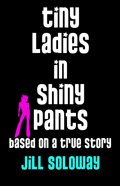
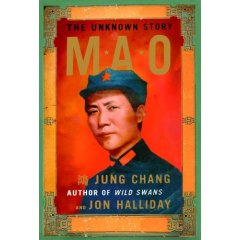 I bought Jill Soloway's book last month, Tiny Ladies in Shiny Pants, and would have started reading it earlier, but I was stuck in Communist China reading Jung Chang's Mao, and like many of the Chinese under his rule, I seemed to be unable to escape until he was dead. And when I say stuck, I mean stuck. I read this book for months. I read this book for so long that when I finally finished it, I felt like I hadn't. I felt like I was still swimming in this Red Communist haze of paranoia, making me unable to commit to reading anything else without guilt. My friend Elle told me that while reading Grisham's The Firm she started to become paranoid because the main character was so constantly freaked out about being bugged and trailed. This finally ended with her sitting with the book in a Starbucks, completely convinced that Someone Was Watching Her. I can totally relate. I spent so much time with the Chairman that my three-year-old son knows more about Mao than any other three-year-old currently living in the Midwest. My six year old can also spot Mao out of a line up, and tell you that Mao was a bad man who starved millions of his own people to death to further his own modest political goal of becoming the ruler of the world. This was mostly thanks to me reading excerpts to them while they were busily pushing their toy boats around in the bathtub. This sometimes led to good discussions.
I bought Jill Soloway's book last month, Tiny Ladies in Shiny Pants, and would have started reading it earlier, but I was stuck in Communist China reading Jung Chang's Mao, and like many of the Chinese under his rule, I seemed to be unable to escape until he was dead. And when I say stuck, I mean stuck. I read this book for months. I read this book for so long that when I finally finished it, I felt like I hadn't. I felt like I was still swimming in this Red Communist haze of paranoia, making me unable to commit to reading anything else without guilt. My friend Elle told me that while reading Grisham's The Firm she started to become paranoid because the main character was so constantly freaked out about being bugged and trailed. This finally ended with her sitting with the book in a Starbucks, completely convinced that Someone Was Watching Her. I can totally relate. I spent so much time with the Chairman that my three-year-old son knows more about Mao than any other three-year-old currently living in the Midwest. My six year old can also spot Mao out of a line up, and tell you that Mao was a bad man who starved millions of his own people to death to further his own modest political goal of becoming the ruler of the world. This was mostly thanks to me reading excerpts to them while they were busily pushing their toy boats around in the bathtub. This sometimes led to good discussions.
"So you see, boys, Mao made it impossible for people to see doctors, yet was obsessed with his own health. Even so, he suffered from constipation his entire life."
"What's constipation?" asked the older one.
"When you can't go poo-poo."
"He should put poo-poo in his mouth. That's how you get diarrhea."
Think for just a second about how different the world would have been had my children been the Chairman's advisors.
But that's not really the point. I wanted to cheat on Mao with you, I did. Sometimes I would go up to Shiny Ladies where it was sitting on my bookshelf and think about picking it up, but I just couldn't do it. I don't know why. I'm a total roundheel when it comes to a new rock hard binding. If the book I'm currently reading begins to flag as far as providing me with constant stimulation, I'm off with another one. What should have happened was you and I sneaking up to the bedroom, leaving Mao to sit on the back of the sofa, where it would continually clock my husband in the head everytime he sat down. (After this happened the fourth time, I heard him cursing the book, muttering, "Damn you, Mao. Still hurting people, even from the grave.")
But I couldn't, and I'll tell you why: I felt like I owed it to Chang to see her book through to the end. She was raised under Mao's rule, finally leaving for London in 1978, two years after Mao's death. She lived as a peasant, was a member of the brutal teenaged Red Guard, a steel worker, and an electrician before going to school and majoring in English literature. She survived the Great Leap Forward and the Cultural Revolution, and my God, does this woman hate Mao. She hates him so much that the book is not a biography so much as an indictment of his crimes, which are detailed in minutia. And she doesn't want to hear any garbage about writing without proof, either. Her purpose in writing was to nail his ass to the wall so thoroughly that the world is forced to acknowledge him as its biggest mass murderer, so each one of his crimes is documented with at least two different sources. She and her husband and co-author Jon Halliday spent 11 years interviewing hundreds of individuals all over the world, from Henry Kissinger to Mao's daughter Li Na to the woman that washed his dirty underpants. Her husband, fluent in Russian, pored over thousands of official documents in Moscow concerning Mao's meetings with Stalin, Khrushchev and Brezhnev. They even took a trip to Pyongyang and irritated officials there. It's interesting to read a biography written by someone who despises her subject and wants to destroy him so utterly that she drowns the reader in proof. This had the effect of making Mao simultaneously boring and horrifying, because military minutia and political machinations aside, the man was as total a sociopath as you could ever meet, and let's face it, Jill, you don't look like a sociopath.  This is not the face of a person who didn't brush her teeth for 27 years, like Mao. This is not the face of someone who would deny her lifelong assistant treatment for his bladder cancer, letting him piss blood for two years. This is not the face of someone who would ban flowers and have all the gardeners in the country killed. This is not the face of someone who would hunt me down and kill me if I didn't put down the book I was reading and read her book right now. I know you work in television, Jill, but you're just not that ruthless. I do not fear you, Solloway. I'm finishing Mao. He's spooky.
This is not the face of a person who didn't brush her teeth for 27 years, like Mao. This is not the face of someone who would deny her lifelong assistant treatment for his bladder cancer, letting him piss blood for two years. This is not the face of someone who would ban flowers and have all the gardeners in the country killed. This is not the face of someone who would hunt me down and kill me if I didn't put down the book I was reading and read her book right now. I know you work in television, Jill, but you're just not that ruthless. I do not fear you, Solloway. I'm finishing Mao. He's spooky.
But finally that freak got Lou Gehrig's disease and died. No longer would I have to hear my three-year-old say, "Are you still reading Mao?" Now I could pick up Tiny Ladies and I have to tell you, it was like I'd spent a year in a 400 level Women's Studies class reading MacKinnon and Butler, then, at the graduation party I got to hang out with the cool TA and discuss the fact that Jessica Simpson never drove the General Lee when we all know that Catherine Bach sometimes did, and isn't it bullshit that they cast a blonde anyway?
It can't be easy to be a thirty-something feminist in L.A., surrounded by women too thin to menstruate (just like in Mao's China - hot damn, I knew there was a connection somewhere!) and who think being on Girls Gone Wild is empowering. But you've managed to use all that silicone as a floating device, writing for Six Feet Under and giving us Claire, the only tv character in recent memory to have an abortion and feel relief, and Ruth, a character over 50 who had a hotter sex life than her 20 year old daughter. And you wrote a great book, one that blends feminism with memoirs of groupie aspirations with writing tips for industry hopefuls. Not to mention trying to single-handedly reclaim the word "Jewess" for yourself. It's not a word I enjoy, myself. It's a bit too antiquated for my taste; outdated, sticky, and bitter, like a drop of absinthe on the tongue.
I really had a great time reading Shiny Ladies (a day and a half read, with minimal child neglect.) But you're right, you're probably going to get your ass kicked for what you said about dogs.


